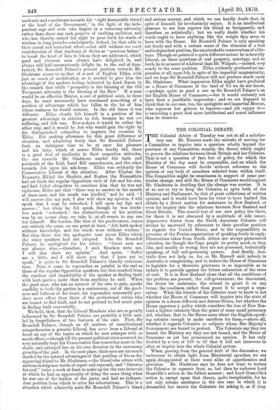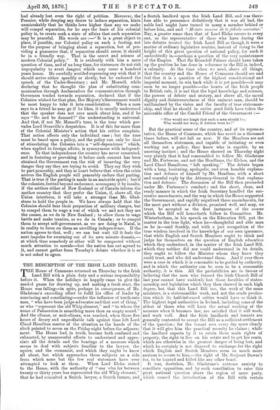THE COLONIAL DEBATE. T HE Colonial debate of Tuesday was not
at all a satisfac- tory one. Mr. Torrens made the mistake of moving for a Committee to inquire into a question wholly beyond the province of any Committee, namely, the theory which ought to govern the relations between Great Britain and her Colonies. That is not a question of fact, but of policy, for which the Ministry of the day must be responsible, and on which the House of Commons will decide without reference to the opinion of any body of members selected from within itself. The Committee might be unanimous in support of some par- ticular change, and still the House of Commons would support Mr. Gladstone in deciding that the change was unwise. It is of no use to try to keep the Colonies, in spite both of the Ministry and Parliament, by dint of great collections of written opinion, and it would have been far wiser to have limited the debate by a direct motion for assistance to New Zealand, or even for inquiry into the relations between New Zealand and Great Britain. The crucial test of our new policy lies there, for there it is not obscured by a multitude of side issues. Arguments drawn from the North American Colonies will always be answered by references to their peculiar position as regards the United States, and to the impossibility in presence of the Fenian organization of speaking freely in reply. Illustrations taken from South Africa are always pronounced valueless, for though the Cape people do pretty much as they like, and usually do wrong, they are not possessed, technically speaking, of full self-governing powers. And finally, Aus- tralia does not help us, for, as Mr. Monsell said, nobody in Australia is complaining, and to induce the House of Commons to legislate for a theoretic grievance is as impossible as to induce it to provide against the future exhaustion of the store of coal. It is in New Zealand alone that all the conditions of the problem are present, the self-government, the discontent, the desire for assistance, the refusal to grant it on any terms, the readiness rather than grant it to accept a sepa- ration. What the friends of the Colonies want to know is not whether the House of Commons will inquire into the state of opinion in a dozen different and distant States, but whether the House approves a policy which considers the loss of New Zea- land a lighter calamity than the grant of some small pecuniary aid, whether, that is, the House cares about the English-speak- ing colonies enough to make sacrifices for them,—above all, whether it regards Colonists as subjects whom Her Majesty's Government are bound to protect. The Colonists say they are bound, the Ministry say they are not bound, and the House of Commons as yet has pronounced no opinion. It has only decided by a vote of 110 to 67 that it will not intervene to alter or inquire into the whole Colonial system.
When, passing from the general drift of the discussion, we endeavour to obtain light from Ministerial speeches, we are again disappointed at their want alike of apprehension and precision. Mr. Gladstone says he does not want to induce the Colonies to separate from us, but then he endorsee Lord Granville's action in the fullest manner ; and Lord Granville's action is, except upon that theory, quite inexplicable, for he not only refuses assistance in the one case in which it is demanded, but taunts the Colonists for asking it, as if they had already lost even the right of petition. Moreover, the Premier, while denying any desire to induce separation, hints unmistakably that he thinks laws higher than any we make will compel separation, for he says the basis of his colonial policy is, to create such a state of affairs that such separation may be peaceful. His words are :—" It is a great object to place, if possible, our Colonial policy on such a footing, not for the purpose of bringing about a separation, but of pro- viding a guarantee that, if separation should occur, it should be in a friendly way. That is the secret and science of modern Colonial policy." It is evidently with him a mere question of time, and of no long time, for statesmen do not risk unpopularity to avert dangers which may come a hundred years hence. He carefully avoided expressing any wish that it should arrive either speedily or slowly, but he endorsed the speech of the Under-Secretary ; and Mr. Monsell, while declaring that he thought the plan of substituting com- munication through Ambassadors for communication through Governors tended towards separation, declared that if the Colonies wished for that plan, Her Majesty's Government would be most happy to take it into consideration. When a man says to a friend he may go if he likes, it is usually understood that the speaker does not care much about him, and if he says " Go and be damned !" the understanding is universal. And that, if not Mr. Monsell's tone, is the tone which per- vades Lord Granville's despatches. It is of this far more than of the Colonial Minister's action that his critics complain. That action affects only the individual case ; but the tone must be based upon a policy, and the policy can only be that of stimulating the Colonies into a " self-dependence " which, when applied to foreign affairs, is synonymous with independ- ence. To that independence the country has never consented, and in fostering or provoking it before such consent has been obtained the Government run the risk of incurring the very danger they say they are trying to avoid. They say they wish to part peaceably, and they at heart believe that when the crisis arrives the English people will peaceably endure that parting. That is true if the parting is made in an amicable spirit ; but if the colonists, fretted beyond endurance, accompany it by insults, if the settlers either of New Zealand or of Canada inform the mother country that they prefer the Union, if, above all, the Union interferes, it will take a stronger than Mr. Glad- stone to hold the people in. We have always held that the Colonies should bear their proportion of military charges, but to compel them to wage a war of which we and not they are the causes, as we do in New Zealand ; to allow them to wage battle and make treaties, as we do in Canada ; or to compel them to accept self-government, as we are doing in Natal, is in reality to force on them an unwilling independence. If the nation agrees to that, well ; we can but wait till it feels the next impulse for swarming out of its own minute domain,— at which time somebody or other will be conquered without much attention to morals—but the nation has not agreed to it, and cannot gather from Tuesday's debate whether it is or is not asked to agree.



































 Previous page
Previous page